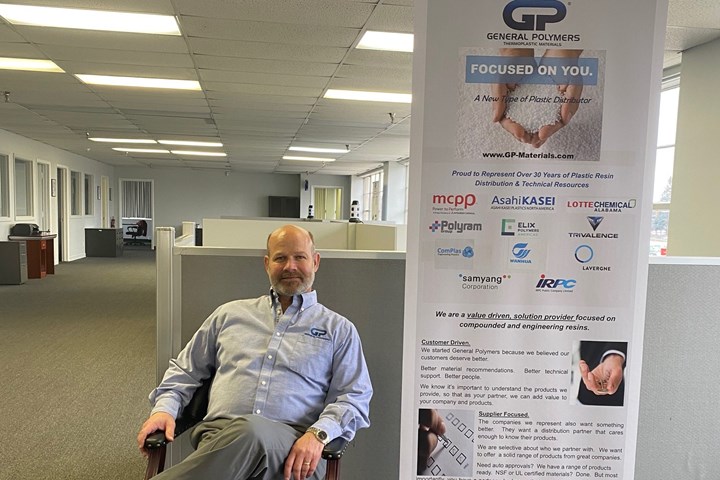Small but Fast-Growing Distributor Unhindered by the Pandemic
With a focus on compounded and engineering resins, General Polymers aligns it market strategy to compliment the supplier and support the needs of processors.
Now going into its fifth year of operation, materials distributor General Polymers Thermoplastic Materials, Rochester Hills, Mich., has continued its steady growth pattern even during the pandemic. Initially, the company’s commercial coverage was the Midwest, but it rapidly expanded into other areas of the U.S. and Canada, as previously reported. Most recently, the company added Minnesota and Tennessee to its roster of regions. This growth has also led to expansion into new warehousing and office space in Rochester Hills.
In a recent interview, co-founder and CEO Gregory Boston noted that despite some necessary adjustments and precautions on how the company’s team works during COVID, the company grew in every aspect throughout 2020. “I think this mostly due to the fact that we are small and nimble and we did not shutdown. This quarter (2021), we are adding a phone back and bringing in new interns for training. We are investing to support continued growth and for industry to open up fully.”

General Polymers has opted to focus on being a value-driven provider with its selection of compounded and engineering thermoplastics, rather than focusing on volume-driven business. Supplier partners include AsahiKasei, Elix Polymers, Mitsubishi, Polyram, Lotte Chemical Alabama, Samyang, IRPC, Color Master, Wanhua Chemical & ComPlas Engineering Plastics. The company’s broad range of products focuses on performance engineering resins such as PPE/PPO and PPS to TPEs, specialty compounds and long-glass compounds—include NSF or UL certified materials and specialty materials requiring automotive approvals.
In assessing the current materials distribution business, Boston refers to the creation of “Big Box Distributors” that have resulted from the acquisition of smaller regional/national distribution entities into larger multinational organizations. “Many become part of an investment company that is driven by volume business, particularly commodity resins. As such, you build up bureaucracies so your sales peoples are not as empowered and often not as knowledgeable.” He also thinks that such distributors also end up having increased restrictions and too many options to provide focus as they become too large to address the varying needs of small-to-mid size processors.
Boston maintains that he aims for his sales people to become more involved with a customer’s product development stage. The company aligns its market strategy to complement its supplier partners and support the needs of processors. “You want to set yourself to be a resource for your molders, designers, suppliers…we have no problem even asking other colleagues in the industry outside of General Polymers to get the best answer for troubleshooting a customer’s needs.” Boston says they look for both industry knowledgeable people and new people to hire “We want our veterans and new entrants to be involved in the business so that they are empowered to make their own decisions and also to give them support.”
Related Content
-
Prices Up for All Volume Resins
First quarter was ending up with upward pricing, primarily due to higher feedstock costs and not supply/demand fundamentals.
-
Prices Bottom Out for Volume Resins?
Flat-to-down trajectory underway for fourth quarter for commodity resins.
-
Prices for All Volume Resins Head Down at End of 2023
Flat-to-downward trajectory for at least this month.















